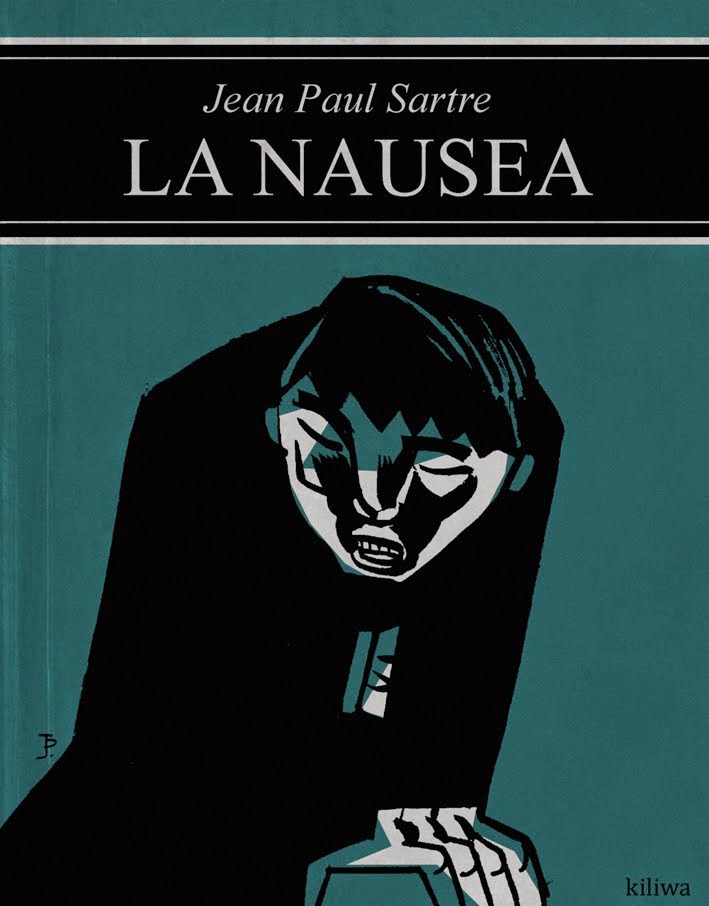Have you ever felt a sudden, inexplicable wave of unease wash over you, a sense of profound disorientation amidst the mundane? An awareness of the absurdity of your own existence, a feeling that the world around you is not quite real, and that your own body is somehow alien? This, dear reader, is the essence of Sartre’s “Nausea,” a philosophical journey into the depths of human experience that resonates with us all. Forget the existential dread of a bad cup of coffee – this is a nausea that goes to the very core of our being.

Image: epubparatodos.blogspot.com
“Nausea,” the title itself, becomes a metaphor for this deep existential discomfort. It’s not about physical sickness, but about the discomfort of simply being in the world. Sartre’s protagonist, Antoine Roquentin, grapples with this feeling as he navigates the streets of Bouville, a fictional French town. His experience is a reflection of humanity’s struggle with the absurdity of existence. Sartre’s masterpiece invites us to confront the chilling reality of our own nothingness, to grapple with the profound questions of freedom, responsibility, and the meaning (or lack thereof) in a life that is inherently finite.
Delving into the Depths of Nausea:
Sartre’s “Nausea” is a novel that demands to be read slowly, savored, and pondered. It’s not a light read, nor intended to be. It challenges our assumptions about the world and ourselves, peeling back layers of our comfortable illusions to reveal the raw, unsettling truth of our existence.
The Power of Being-in-Itself: Sartre’s philosophy of existentialism is central to the novel. Rather than some predetermined essence, we are thrown into existence without any inherent meaning or purpose. We are, in Sartre’s words, “condemned to be free” and ultimately responsible for the choices we make. This resonated with me profoundly. I found myself reflecting on the choices I’ve made, questioning their significance and impact.
The Absurdity of Everyday Life: Roquentin’s experience with nausea is triggered by everyday objects and encounters. A root, a pebble, a waiter pouring coffee – these simple things, in their inexplicable presence, trigger a profound sense of alienation. The mundane becomes monstrous, the familiar becomes foreign. This feeling of the absurd, the existential nausea, is the crux of Sartre’s message. He strips away the illusion of meaning, forcing us to confront the chilling reality of our existence as a meaningless blip in the vastness of the cosmos.
The Weight of Responsibility: As Roquentin grapples with nausea, he also confronts the weight of his own freedom. Being condemned to be free is not a blessing, but a burden. It means we are solely responsible for our choices, and we can never escape the consequences of our actions. The freedom Sartre describes is not the freedom of a playground, but the freedom of a battlefield, where every decision carries the weight of creating our own destiny.
Seeking Authenticity: Through Roquentin’s struggle, Sartre explores the quest for authenticity. How can we live authentically in a world where everything is ultimately meaningless? There’s no easy answer. Authenticity, for Sartre, means embracing the absurdity, accepting our freedom, and making choices that reflect our own values, even if those values are ultimately meaningless in the grand scheme of things.
Navigating the Nausea:
Sartre’s “Nausea” can be a challenging but ultimately rewarding experience. It’s a book that pushes us to confront the uncomfortable truths about ourselves and our place in the world. But, just as a wave of nausea can pass, so too can this existential discomfort.
Finding Meaning in Meaninglessness: Sartre’s work doesn’t necessarily offer a solution or a comforting answer. However, it does offer an insightful perspective. Perhaps the meaning we seek doesn’t exist in the external world, but in the choices we make, the relationships we cultivate, and the art we create. It’s in the act of living, not in the search for some predetermined purpose, where we might find a sense of fulfillment.
Don’t Fear the Nausea: Embrace the unsettling feeling of nausea as an opportunity for growth. It can be a catalyst for self-discovery, pushing you to question your assumptions, explore new perspectives, and live a life driven by your own values and choices.

Image: mporcius.blogspot.com
Nausea By Jean Paul Sartre Pdf
https://youtube.com/watch?v=SznakPwwuP8
Conclusion:
“Nausea” is a book that will stay with you long after you’ve finished reading it. It’s a challenging but ultimately liberating experience, forcing you to confront the absurdity of existence and embrace the weight of your own freedom. Don’t be afraid to dive into the depths of Sartre’s masterpiece. You might just discover a profound truth about yourself in the process. As you navigate the nausea of existence, remember, you are not alone. You are in the company of countless others who have sought to make meaning from the absurd, and in the process, have shaped a world of art, literature, and thought that remains a testament to the enduring human spirit.






